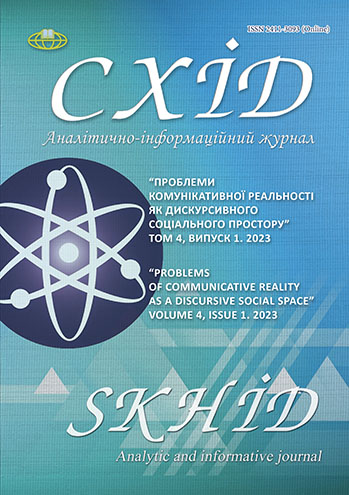The formation of sensory life discourse in the conditions of “Other” sociocultural experience
DOI:
https://doi.org/10.21847/2411-3093.2023.4(1).275502Keywords:
experience, sense, meaning, sense perception, sensory understanding, discourse, communication, community, responsibilityAbstract
The article discusses the study of discourse related to sensual life within the context of a different sociocultural experience. The formation of this discourse is said to be influenced by legitimizing the horizontal principle in social relations, which is mainly constituted by research and developmental epistemic and discur-sive influences on the social, political, and cultural situation in society. The author employs a methodological procedure to differentiate between sensory perception and sensory understanding at the level of emotional intellect, highlighting the indi-vidual contributions of each in shaping the discourse on sensual life. It is conclud-ed що the request for the constitution of the existential meanings of the organization of life is growing under the influence of the growth of the degree of individual freedom of human beings and the formation of an open communicative space of life. They are formed in the field of voluntary horizontal actions, prompting the person to self-activation and sense finding. Sense is associated with human sensation, sensitivity and perception “at the level of the senses” and physicality "at the level of intelligence”. Meaning at the “sense level” is manifested by “common sense” and the right direction in life, and “at the intellectual level,” meaning is determined by reflective thinking, relevant discursive ethical practices and worldviews as well as cognitive orientations.
Downloads
References
Bauman, Zygmunt (2009). Does ethics have a chance in the world of the consumer? First Harward University Press.
Bauman, Zygmunt & Donskis, Leonidas (2013). Moral blindness: the loss of sensitivity in liquid modernity. Polity Press.
Butler, Judith (2006). Gender trouble: feminism and the subversion of identity. Routledge.
Brugère, Fabien (2011). ‘Common sense, in European Dictionary of Philosophies: A Lexicon of Intranslatability (transl. from Engl.). Kyiv, Dukh I Litera, 76–78. (In Ukrainian)
Dominick, Joseph (1999). The Dynamics of Mass Communication. Boston, McGraw-Hill Companies.
Frankl, Viktor Emil (1988). Man’s search for meaning. Pocket Books.
Foucault, Paul-Michel (2002). Archaeology of knowledge. Routledge.
Karas, Anatoliy (2003). Filosofiya hromadyansʹkoho suspilʹstva v klasychnykh teoriyakh i neklasychnykh interpretatsiyakhю Lviv: LNU named after I. Franko (In Ukrainian).
Kloczowski, Jan Andrzej (2013). Filosofiya dialohu (transl. from Pol.). Kyiv: Dukh i litera (In Ukrainian).
Lall, James (2002). Mas-media, komunikatsiya, kultura: hlobalnyy pidkhid (transl. from Eng.). Kyiv, K. I. S. (In Ukrainian).
Levinas, Emmanuel (1999). Mizh namy: doslidzhennya dumky-pro-inshoho (transl. from Eng.). Kyiv, Dukh i litera (In Ukrainian).
Mauss, Marcel (2002). The gift: the form and reason for ex-change in archaic societies. Routledge.
Nancy, Jean-Luc (2013). Tielo (Corpus). Moscow, Ad Marginem. (In Russian)
Peters, Thomas (2004). Slova na vitri: istoriya ideyi komunikatsiyi (transl. from Eng.). Kyi, Kyiv-Mohyla Academy. (In Ukrainian)
Phenix, Phillip (1964). Realms of meaning: a philosophy of the curriculum for general education. New York (etc.). McGraw-Hill. XIV.
Castells, Manuel (2009). The power of identity. Warsaw, Polish Scientific Publishers PWN.
Schütz, Alfred, Luckmann Thomas (1989). The structures of the life-world. Northwestern University Press.
Taylor, Charles (2013). Etyka avtentychnosti (transl. from Eng.). Kyiv: Dukh i Litera (In Ukrainian)
Weil, Simone (2001). The Need for Roots: Prelude to a Declaration of Duties Towards Mankind, Routledge.
Downloads
Published
How to Cite
Issue
Section
License
Copyright (c) 2023 Лідія Сафонік

This work is licensed under a Creative Commons Attribution-NonCommercial-NoDerivatives 4.0 International License.
1. Authors bear responsibility for the accuracy of facts, quotations, numbers and names used.
2. Manuscripts are not sent back.
3. The publisher does not always agree with the authors' opinion.
4. The authors reserve the right to authorship of the work and pass the first publication right of this work to the journal under the terms of a Creative Commons Attribution-NonCommercial-NoDerivatives 4.0 International License. This license allows others to distribute (copy) the published work for non-commercial purposes, provided there is mandatory attribution to its authors and a link to the first publication in our journal.
5. The authors have the right to conclude separate supplement agreements that relate to non-exclusive work distribution in the form in which it has been published by the journal (for example, to upload the work to the online storage of the journal or publish it as part of a monograph), provided that the reference to the first publication of the work in this journal is included.

